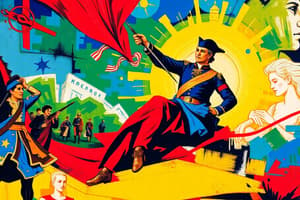Podcast
Questions and Answers
¿Qué sistema de castas raciales fue impuesto durante la colonia en América Latina?
¿Qué sistema de castas raciales fue impuesto durante la colonia en América Latina?
El sistema de castas raciales fue impuesto durante la colonia en América Latina.
¿Quién inició la lucha por la independencia de los países que formaban parte del Virreinato de Nueva Granada?
¿Quién inició la lucha por la independencia de los países que formaban parte del Virreinato de Nueva Granada?
Simón Bolívar inició la lucha por la independencia de estos países.
¿Por qué se iniciaron las rebeliones entre las poblaciones oprimidas de América Latina durante la colonia?
¿Por qué se iniciaron las rebeliones entre las poblaciones oprimidas de América Latina durante la colonia?
Se iniciaron debido al sistema de castas raciales que las oprimía.
¿Cuánto tiempo duraron las guerras de independencia en América Latina?
¿Cuánto tiempo duraron las guerras de independencia en América Latina?
¿A quiénes lideraron los movimientos de independencia en América Latina?
¿A quiénes lideraron los movimientos de independencia en América Latina?
¿Qué factores contribuyeron a la independencia de América Latina?
¿Qué factores contribuyeron a la independencia de América Latina?
¿Cuáles fueron algunas de las causas de los movimientos de independencia en América Latina?
¿Cuáles fueron algunas de las causas de los movimientos de independencia en América Latina?
¿Quiénes eran los criollos y cómo se vieron afectados por las reformas de los Borbones?
¿Quiénes eran los criollos y cómo se vieron afectados por las reformas de los Borbones?
¿Qué figuras destacadas jugaron un papel importante en los movimientos de independencia en América del Sur?
¿Qué figuras destacadas jugaron un papel importante en los movimientos de independencia en América del Sur?
¿Qué papel desempeñó Simón Bolívar en los movimientos independentistas?
¿Qué papel desempeñó Simón Bolívar en los movimientos independentistas?
¿Cuál fue el impacto de la colonización en los movimientos de independencia en América Latina?
¿Cuál fue el impacto de la colonización en los movimientos de independencia en América Latina?
¿Dónde se encontraron finalmente Simón Bolívar y José de San Martín en su lucha por la independencia?
¿Dónde se encontraron finalmente Simón Bolívar y José de San Martín en su lucha por la independencia?
Flashcards are hidden until you start studying
Study Notes
Independence in Latin America
Causes of Independence Movements
The causes of independence movements in Latin America can be traced back to the economic, social, and political changes that occurred during the colonial era. The reforms imposed by the Spanish Bourbons in the 18th century, such as the imposition of taxes and restrictions on trade, led to instability in the relations between the Spanish crown and the American-born elites, known as Creoles. These Creoles felt that their political power and social status were being unfairly attacked by the Bourbons, who favored peninsular Spaniards in administrative positions. The gradual loosening of trade restrictions actually benefited some Creoles in Venezuela and certain areas, but it only fueled their desire for greater free trade.
Key Figures in the Independence Movements
Two prominent figures who played a significant role in the independence movements in South America were Simón Bolívar and José de San Martín. Bolívar, known as the Liberator, led a movement from the north, while San Martín, more circumspect, led a movement from the south. After difficult conquests of their home regions, the two movements spread the cause of independence through other territories, finally meeting on the central Pacific coast.
Impact of Colonization on Independence
The impact of colonization on independence was significant. Over three centuries of colonial rule enforced a racial caste system, which instigated rebellion among the oppressed and marginalized populations. The specter of "another Haiti" was raised as a justification for merciless suppression of conflicts, and news about the conflict was suppressed as much as possible by administrators in colonial Latin America.
Independence Declarations
Independence declarations were made by various Latin American countries in the early 19th century. For example, Chile and Mexico began their independence movements in 1810, although their autonomy was not secured until later. In the northern part of South America, Simón Bolívar initiated his fight for independence by liberating the countries that formed part of the Viceroyalty of New Ecuador, Panama, and Venezuela.
Independence Wars
The independence wars in Latin America lasted from 1808 to 1826 and involved a series of conflicts between Creoles and Spanish forces. The wars were driven by long-held resentments among the American-born leadership, who felt that the Spanish monarchy no longer represented them. The absence of a legitimate Spanish monarch during this period allowed movements toward independence to flourish, and the Spanish subjects rejected the rule of Joseph, Napoleon's brother, who was installed as king.
In conclusion, the independence of Latin America came about as a result of a combination of long-building tensions in colonial rule, the impact of European revolutions, and the desire for greater self-determination among the American-born elites. The independence movements were led by key figures like Simón Bolívar and José de San Martín, and the struggles for independence took place over several decades, with the final victory coming in 1826.
Studying That Suits You
Use AI to generate personalized quizzes and flashcards to suit your learning preferences.




